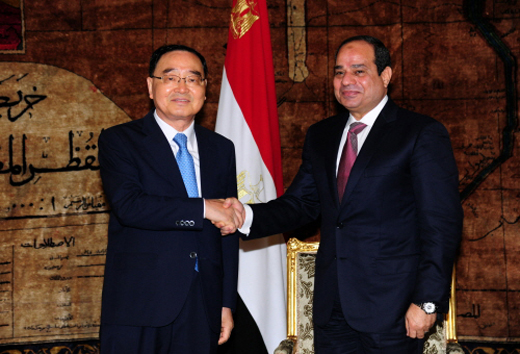이집트 순방 정홍원 총리, "이집트 원전 건설에 제안서 제출하겠다"
입찰서 올해 말까지 제출해야
이집트 원전건설 예정지 엘다바(El-Dabaa)
[관련보도링크]
September 30, 2014
Dabaa nuclear project to provide 50% of electrical power to Egypt
22 July 2014
A tender to construct Egypt's first nuclear power plant will now be launched by the end
of 2014. The tender for the El-Dabaa plant was originally scheduled for earlier this year.
http://www.world-nuclear-news.org/NN-Tender-for-Egyptian-plant-rescheduled-2207144.html
2013.10.19
이집트 첫 원전 건설 한국-러시아 '2파전' 가능성
http://www.yonhapnews.co.kr/international/2013/10/29/0601170100AKR20131029181400079.HTML
kcontents
|
정홍원 국무총리는 23일(현지시간) 압델 파타 알시시 이집트 대통령을 면담하고 “이집트가 추진 중인 원전 건설에 제안서를 제출하겠다”고 밝혔다.
지난 22일부터 ‘북아프리카 및 코카서스’ 경제외교 순방에 나선 정 총리는 첫 목적지로 이집트를 공식 방문 중이다.
이 자리에서 정 총리는 “우리의 원전 기술을 이전하고 이집트의 원전 인력 양성을 도울 용의가 있다”며 이집트 원전건설 참여의사를 밝혔다.
심각한 전력난을 겪고 있는 이집트가 처음으로 건설하는 원전의 규모는 4000~6000메가와트 정도인 것으로 알려져 있다. 이는 우리나라가 아랍에미리트연합(UAE)에 건설 중인 200억 달러 규모의 원전 4기와 비슷하다.
정 총리와 알시시 대통령은 이날 회담에서 이집트 정부가 추진 중인 수에즈 운하 확장, 홍해 근교 환경친화도시 개발, 카이로 지하철 추가 건설 등 대규모 프로젝트에 우리 기업이 참여하는 등 양국의 경제협력을 강화하기로 했다.
이를 위해 양국은 외교부를 중심으로 관계부처들이 참여하는 협력위원회를 조속한 시일 내에 구성하기로 합의했다.
아울러 알시시 대통령은 “한국이 북한 문제에 지혜롭게 대처하고 있다”면서 한국의 대북정책에 대한 지지의사를 밝혔다.
한편, 정 총리는 회담 후 2005년 아랍권 최초로 한국어과를 개설한 아인 샴스 대학교 한국어과 교수진 및 학생들과 간담회를 갖고 “이집트 내 한국어 보급, 한류 확산 등을 위해 계속 노력해 달라”고 격려했다. 문의: 국무조정실 외교안보정책관실 044-200-2135 2014.11.24 국무조정실 |
|
Egypt is to revive the civilian nuclear power programme it froze 20 years ago following the accident at the Chernobyl plant in Ukraine.
Egypt's energy minister told the state-owned al-Ahram newspaper of plans to build a nuclear power station.
The plant will be constructed at El-Dabaa, on the Mediterranean coast, within the next 10 years.
Demand for electricity has been growing at an average rate of 7% a year and the country faces worsening shortages.
On Thursday, President Hosni Mubarak said Egypt needed to investigate new sources of energy, including the nuclear option.
Energy Minister Hassan Younes said that the project would create a fully functioning nuclear power plant within a decade.
The facility, a 1,000 megawatt nuclear power plant, is expected to cost an estimated US$1.5bn (1.17bn euros). The Cairo government says it will seek foreign investment for the project.
IAEA questions
Though it abandoned a serious nuclear energy programme two decades ago, Egypt maintains a small experimental nuclear reactor.
In February 2005 the International Atomic Energy Agency (IAEA) disclosed that it was investigating Egypt's nuclear activities.
It concluded that Egypt had conducted atomic research, but that the research did not aim to develop nuclear weapons and did not include uranium enrichment.
Egypt admitted to failing to disclose the full extent of its nuclear research activities to the UN's watchdog. Officials said the failure arose because of a misunderstanding over exactly what had to be disclosed.
NPT signatory
Egypt is a signatory to the Nuclear Non-Proliferation Treaty, which allows countries to build nuclear power stations under international supervision.
It has long pressed for a Middle East free of nuclear weapons.
Israel is the only state in the region with a known nuclear arsenal, though it maintains a position of "ambiguity" on its nuclear weapons, insisting that it will not be the first state to introduce nuclear weapons to the region.
Iran is in dispute with the IAEA and the Security Council over its nuclear programme.
Tehran insists its programme is peaceful, but western states believe Iran secretly wants to develop either a nuclear bomb or the ability to make one. The Security Council is demanding that Tehran halt nuclear enrichment, a step Iran is refusing to comply with.
Source: BBC News |
Construction News
CONPAPER











